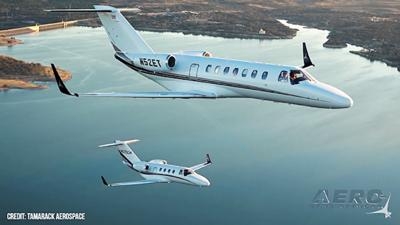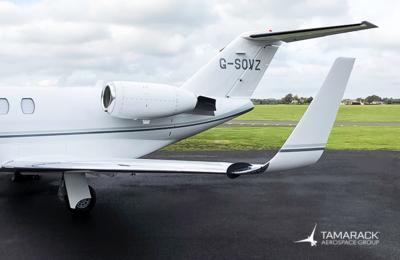Sun, Nov 07, 2021
Says 2018 Citation Crash Report Self-Contradictory
Tamarack has disputed the findings of probable cause in the NTSB’s final report of a 2018 crash of Cessna Citation N525EG.

The Board faulted Tamarack’s Active Winglet system, alleging that the crash was the result of an “asymmetric deployment of the leftwing load alleviation system for undetermined reasons.” Tamarack states that forensic evidence collected in the course of the investigation proved that the load alleviation was indeed functioning correctly and deploying symmetrically upon impact. Additionally, the company points out a number of inconsistencies and omissions in the official report.
First, they note that the NTSB’s final report states the aircraft was rolling at 5 degrees per second, when the autopilot automatically disconnected at 30 degrees of bank, not, as a functioning Citation autopilot would, at 45 degrees of bank or 10 degrees per second. They note the failure of the investigation to account for the premature autopilot disconnect and inappropriate automated response for an excessive bank condition.
Tamarack notes their full cooperation throughout the investigation, but says the NTSB published a revised Factual Report, then the Final Report, without taking into consideration alternative causes.

Their supplemental data paints a picture of target fixation on the part of the agency, as if the concept of an active aerodynamics system was so clearly the cause of the crash that it precluded serious effort into any other avenue. They recall that the Final Report includes information that the pilot was able to carry out some corrective action late in the flight at very high speeds, but fail to make mention that, if there were an active winglet failure, then the aircraft would have been easier to recover at slower speeds. They point to this as a possible lead in understanding the true source of the incident.
They note with sadness the casualties of the accident, and wish to ascertain everything possible that they may prevent future loss of another member of their Citation family.
More News
From 2023 (YouTube Edition): "Ain’t Your Daddy’s Super Cub”—Don Wade Co-owned by Don and Ron Wade—the former of Don’s Dream Machines, a storied >[...]
Pilot-Rated Passenger Reported That The Pilot Did Not Adequately “Round Out” The Landing Flare And The Airplane Bounced And Yawed To The Right Analysis: The pilot state>[...]
Dead Reckoning Dead reckoning, as applied to flying, is the navigation of an airplane solely by means of computations based on airspeed, course, heading, wind direction, and speed,>[...]
Aero Linx: Lake Amphibian Club This website is created and sponsored by the Lake Amphibian Club, to help spread the word about these wonderful, versatile amphibians that can land j>[...]
“I am deeply honored to be sworn in as NASA administrator. NASA’s mission is as imperative and urgent as ever — to push the boundaries of human exploration, ignit>[...]
 Classic Aero-TV: In Praise of Alabamas Patriot Aircraft USA
Classic Aero-TV: In Praise of Alabamas Patriot Aircraft USA NTSB Final Report: Cirrus Design Corp SR22
NTSB Final Report: Cirrus Design Corp SR22 ANN's Daily Aero-Term (12.21.25): Dead Reckoning
ANN's Daily Aero-Term (12.21.25): Dead Reckoning ANN's Daily Aero-Linx (12.21.25)
ANN's Daily Aero-Linx (12.21.25) Aero-News: Quote of the Day (12.21.25)
Aero-News: Quote of the Day (12.21.25)




